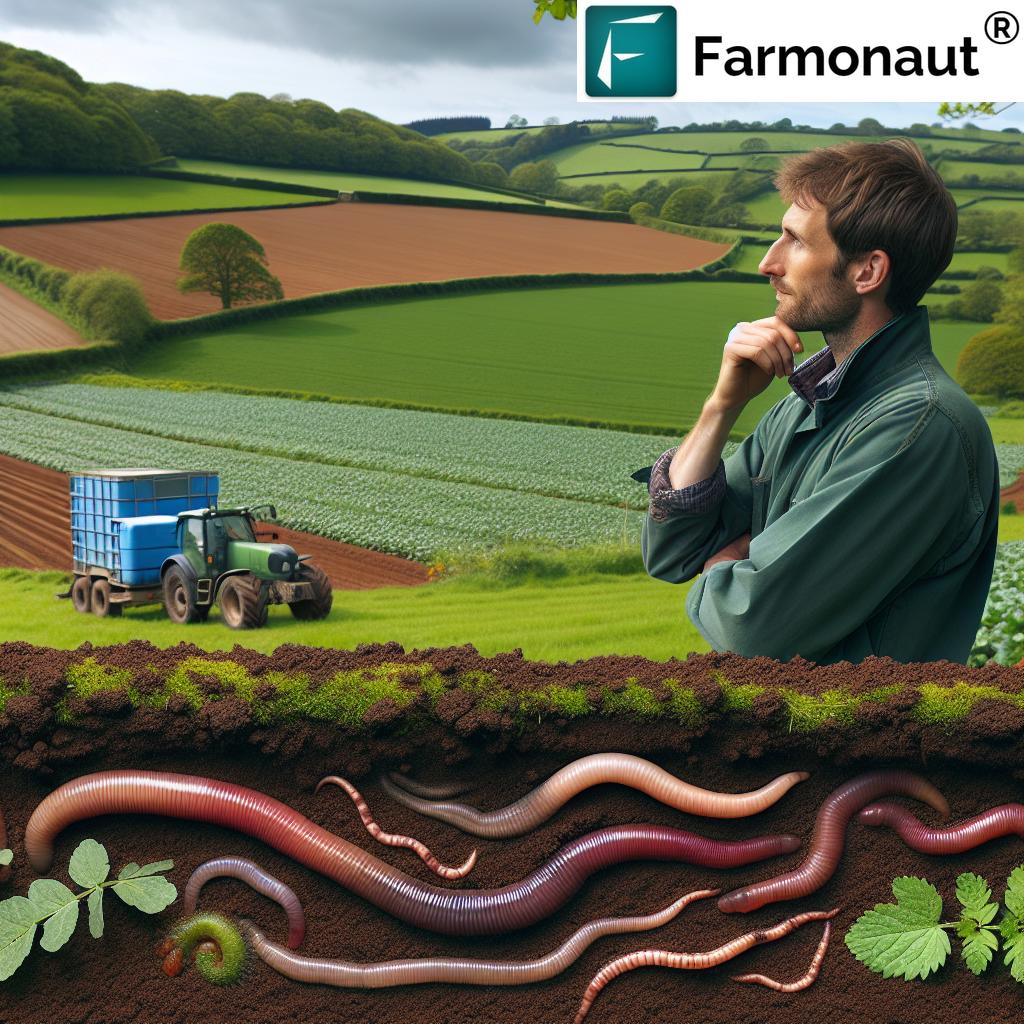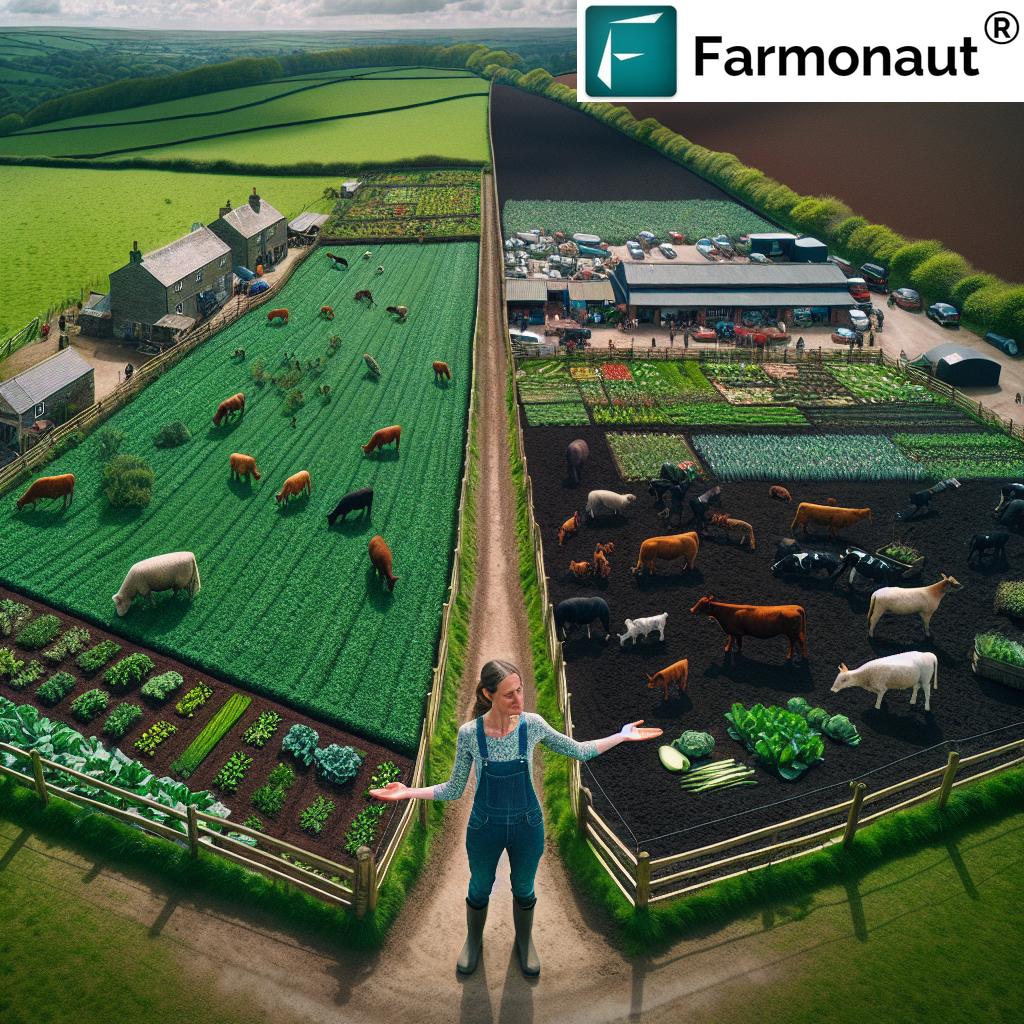Revolutionizing UK Agriculture: How Sustainable Farming Practices Can Boost Farmer Profits and Biodiversity
“UK farmers adopting sustainable practices can increase profits by up to 40% while boosting biodiversity by 30%.”
In the heart of Britain’s rolling countryside, a quiet revolution is taking place. As we delve into the world of UK agriculture, we find ourselves at a critical juncture where traditional farming methods are being challenged by the pressing need for sustainability. The British farming industry, long revered for its contribution to the nation’s food security and rural economy, is facing a crisis that demands innovative solutions. In this comprehensive exploration, we’ll uncover how sustainable farming practices are not just an environmental imperative but also a pathway to increased profitability for farmers and enhanced biodiversity across the UK’s diverse landscapes.

The Current State of UK Agriculture: Challenges and Opportunities
The UK farming industry is at a crossroads. On one side, we have a rich agricultural heritage that has fed the nation for centuries. On the other, we face unprecedented challenges that threaten the very fabric of British food production. Let’s break down the key issues:
- Economic Pressures: Many farmers are struggling to make ends meet, caught between rising input costs and fluctuating market prices.
- Environmental Concerns: Intensive farming practices have led to soil degradation, water pollution, and loss of biodiversity.
- Climate Change: Unpredictable weather patterns are making crop planning and livestock management increasingly difficult.
- Brexit Impact: Changes in agricultural policies and trade agreements are creating uncertainty for farmers.
Despite these challenges, there’s a growing recognition that sustainable farming practices could be the key to not only surviving but thriving in this new agricultural landscape. We’re seeing a shift towards methods that work with nature rather than against it, promising better outcomes for farmers, consumers, and the environment alike.
Sustainable Farming: A Win-Win for Profits and Planet
Sustainable agriculture isn’t just about being eco-friendly; it’s about creating a resilient and profitable farming system that can withstand the tests of time and climate. Here’s how sustainable practices are revolutionizing UK agriculture:
- Soil Health Management: By implementing techniques such as cover cropping, reduced tillage, and crop rotation, farmers are improving soil structure and fertility. This not only boosts crop yields but also increases the soil’s capacity to sequester carbon, contributing to climate change mitigation.
- Precision Agriculture: Leveraging technology like satellite-based crop monitoring can optimize resource use, leading to significant cost savings and environmental benefits.
- Biodiversity Enhancement: Creating habitat corridors, maintaining hedgerows, and implementing integrated pest management strategies can boost on-farm biodiversity, leading to natural pest control and improved pollination.
- Water Management: Efficient irrigation systems and water-conserving practices not only reduce costs but also make farms more resilient to drought conditions.
As we explore these sustainable practices, it’s crucial to understand how they can be implemented effectively on UK farms. This is where innovative technologies come into play, offering farmers the tools they need to make informed decisions and optimize their operations.
The Role of Technology in Sustainable Farming
In the quest for sustainable agriculture, technology is proving to be a game-changer. Satellite-based crop health monitoring systems, like those offered by Farmonaut, are at the forefront of this agricultural revolution. These advanced tools provide farmers with real-time insights into their crops’ health, soil moisture levels, and potential pest issues, enabling them to make data-driven decisions that optimize yields while minimizing environmental impact.
“Satellite-based crop monitoring can reduce water usage by 25% and fertilizer application by 20% in UK agriculture.”
Here’s how technology is supporting sustainable farming practices in the UK:
- Precision Resource Management: By using satellite imagery and AI-driven analytics, farmers can apply water, fertilizers, and pesticides precisely where and when they’re needed, reducing waste and environmental impact.
- Early Problem Detection: Advanced monitoring systems can identify crop health issues before they become visible to the naked eye, allowing for early intervention and prevention of crop losses.
- Climate-Smart Agriculture: Access to accurate weather forecasts and historical climate data helps farmers adapt their practices to changing conditions, improving resilience to climate variability.
- Biodiversity Mapping: Satellite technology can help map and monitor biodiversity on farms, supporting efforts to create and maintain wildlife habitats alongside productive agricultural land.
To explore how these technologies can benefit your farm, consider checking out Farmonaut’s web application or downloading their mobile apps for Android and iOS.

Comparing Traditional and Sustainable Farming Practices
To understand the full impact of sustainable farming practices on UK agriculture, let’s compare them with traditional methods:
| Farming Aspect | Traditional Methods | Sustainable Practices |
|---|---|---|
| Soil Management | Intensive tillage, heavy chemical inputs | Minimal tillage, cover crops, organic amendments |
| Water Usage | Flood irrigation, high water consumption | Drip irrigation, rainwater harvesting |
| Pest Control | Heavy reliance on chemical pesticides | Integrated Pest Management (IPM), biological control |
| Biodiversity Impact | Monoculture, reduced wildlife habitats | Polyculture, creation of wildlife corridors |
| Profitability | High input costs, variable yields | Lower input costs, stable yields, premium pricing for sustainable products |
This comparison clearly shows the potential benefits of transitioning to sustainable practices. Not only do these methods reduce environmental impact, but they also offer pathways to improved profitability through reduced input costs and potential premium pricing for sustainably produced goods.
The Economic Case for Sustainable Farming
While the environmental benefits of sustainable farming are clear, many farmers are understandably concerned about the economic implications of transitioning to new practices. However, evidence is mounting that sustainable farming can indeed boost farmer profits. Here’s how:
- Reduced Input Costs: By optimizing the use of water, fertilizers, and pesticides, farmers can significantly reduce their operational expenses.
- Improved Soil Health: Healthier soils lead to better yields and more resilient crops, reducing the risk of crop failures.
- Diversified Income Streams: Sustainable farms often benefit from diversification, such as agritourism or premium product lines, which can provide additional income.
- Access to Niche Markets: Consumers are increasingly willing to pay a premium for sustainably produced food, opening up new market opportunities for farmers.
- Government Incentives: As the UK government shifts its agricultural policies post-Brexit, there are likely to be increased financial incentives for environmentally friendly farming practices.
Biodiversity: The Hidden Treasure of Sustainable Farming
Enhancing biodiversity on farms isn’t just good for the environment; it’s a smart business move. A biodiverse farm is more resilient, less susceptible to pests and diseases, and can even improve crop yields through better pollination and natural pest control. Here’s how UK farmers are boosting biodiversity:
- Hedgerow Restoration: Planting and maintaining hedgerows provides habitat for wildlife and acts as natural windbreaks.
- Field Margins: Leaving uncultivated margins around fields creates corridors for wildlife movement.
- Agroforestry: Integrating trees into farmland can improve soil health, provide additional income, and create diverse habitats.
- Pond Creation: Farm ponds support aquatic life and provide water sources for wildlife.
By implementing these practices, farmers are not only contributing to conservation efforts but also creating more stable and productive agricultural ecosystems.
Overcoming Barriers to Adoption
While the benefits of sustainable farming are clear, there are still barriers that prevent widespread adoption. These include:
- Initial Costs: Transitioning to sustainable practices may require upfront investments in new equipment or technologies.
- Knowledge Gap: Many farmers may lack the expertise needed to implement new sustainable techniques effectively.
- Risk Aversion: Farmers may be hesitant to change long-standing practices, especially if they perceive the transition as risky.
- Policy Uncertainty: Changing agricultural policies and subsidy structures can create uncertainty around long-term planning.
To address these challenges, we need a multi-faceted approach involving education, financial support, and policy incentives. This is where technologies like Farmonaut’s satellite-based crop monitoring can play a crucial role, providing farmers with the data and insights they need to make informed decisions about sustainable practices.
The Future of UK Agriculture: A Vision for Sustainability
As we look to the future of UK agriculture, we envision a sector that is not only productive and profitable but also environmentally sustainable and socially responsible. This future is characterized by:
- Tech-Enabled Farming: Widespread adoption of precision agriculture technologies, including satellite monitoring and AI-driven decision support systems.
- Regenerative Practices: A shift towards farming methods that regenerate soil health and ecosystem functions.
- Circular Economy: Integration of farming into local circular economies, reducing waste and creating new value streams.
- Climate Resilience: Farms that are better equipped to withstand and adapt to changing climate conditions.
- Biodiversity Net Gain: Agricultural landscapes that support thriving ecosystems alongside productive farmland.
Achieving this vision will require collaboration between farmers, policymakers, researchers, and technology providers. Companies like Farmonaut are at the forefront of this transformation, offering tools that make sustainable farming more accessible and effective.
Conclusion: A Call to Action for UK Farmers
The transition to sustainable farming practices represents both a challenge and an opportunity for UK agriculture. By embracing these methods, farmers can improve their profitability, enhance biodiversity, and contribute to a more resilient food system. The key lies in leveraging the right technologies and knowledge to make informed decisions and implement changes effectively.
We encourage UK farmers to explore the possibilities of sustainable agriculture:
- Investigate technologies like Farmonaut’s satellite-based crop monitoring to gain insights into your farm’s health and performance.
- Connect with local agricultural extension services and sustainable farming networks to learn from peers and experts.
- Consider gradual implementation of sustainable practices, starting with small-scale trials to build confidence and expertise.
- Stay informed about government policies and incentives that support the transition to sustainable farming.
By taking these steps, UK farmers can position themselves at the forefront of a new agricultural revolution – one that promises a brighter, more sustainable future for British food production.
FAQs
- What are the main benefits of sustainable farming practices for UK farmers?
Sustainable farming practices can lead to reduced input costs, improved soil health, increased biodiversity, and potential access to premium markets for sustainably produced goods. - How can technology like satellite-based crop monitoring help in sustainable farming?
Satellite-based crop monitoring provides real-time insights into crop health, soil moisture, and potential issues, allowing farmers to make data-driven decisions that optimize resource use and reduce environmental impact. - What are some examples of sustainable farming practices suitable for UK agriculture?
Examples include minimal tillage, cover cropping, integrated pest management, precision agriculture, and agroforestry. - How does sustainable farming contribute to biodiversity?
Sustainable farming practices create diverse habitats, reduce chemical inputs, and promote soil health, all of which support a wide range of plant and animal species on farmland. - Are there government incentives for UK farmers to adopt sustainable practices?
Yes, the UK government is developing new agricultural policies post-Brexit that are expected to include financial incentives for environmentally friendly farming practices.
Earn With Farmonaut: Affiliate Program
Earn 20% recurring commission with Farmonaut’s affiliate program by sharing your promo code and helping farmers save 10%. Onboard 10 Elite farmers monthly to earn a minimum of $148,000 annually—start now and grow your income!
Farmonaut Subscriptions
Ready to revolutionize your farming practices? Explore Farmonaut’s solutions:
For developers interested in integrating Farmonaut’s satellite and weather data into their own applications, check out our API and API Developer Docs.








Thank you for the article, very informative and useful! Sustainable farming practices not only increase profits but also improve the environment and biodiversity.